- Home
- Patrick Rothfuss
The Lightning Tree
The Lightning Tree Read online
THE LIGHTNING TREE
Patrick Rothfuss
Morning: The Narrow Road
Bast almost made it out the back door of
the Waystone Inn.
He actually had made it outside, both
feet were over the threshold and the door
was almost entirely eased shut behind
him before he heard his master’s voice.
Bast paused, hand on the latch. He
frowned at the door, hardly a handspan
from being closed. He hadn’t made any
noise. He knew it. He was familiar with
all the silent pieces of the inn, which
floorboards sighed beneath a foot, which
windows stuck …
The back door’s hinges creaked
sometimes, depending on their mood, but
that was easy to work around. Bast
shifted his grip on the latch, lifted up so
that the door’s weight didn’t hang so
heavy, then eased it slowly closed. No
creak. The swinging door was softer than
a sigh.
Bast stood upright and grinned. His
face was sweet and sly and wild. He
looked like a naughty child who had
managed to steal the moon and eat it. His
smile was like the last sliver of
remaining moon, sharp and white and
dangerous.
“Bast!” The call came again, louder
this time. Nothing so crass as a shout, his
master would never stoop to bellowing.
But when he wanted to be heard, his
baritone would not be stopped by
anything so insubstantial as an oaken
door. His voice carried like a horn, and
Bast felt his name tug at him like a hand
around his heart.
Bast sighed, then opened the door
lightly and strode back inside. He was
dark, and tall, and lovely. When he
walked he looked like he was dancing.
“Yes, Reshi?” he called.
After a moment the innkeeper stepped
into the kitchen; he wore a clean white
apron and his hair was red. Other than
that, he was painfully unremarkable. His
face held the doughy placidness of bored
innkeepers everywhere. Despite the early
hour, he looked tired.
He handed Bast a leather book. “You
almost forgot this,” he said without a hint
of sarcasm.
Bast took the book and made a show of
looking surprised. “Oh! Thank you,
Reshi!”
The innkeeper shrugged and his mouth
made the shape of a smile. “No bother,
Bast. While you’re out on your errands,
would you mind picking up some eggs?”
Bast nodded, tucking the book under his
arm. “Anything else?” he asked dutifully.
“Maybe some carrots too. I’m thinking
we’ll do stew tonight. It’s Felling, so
we’ll need to be ready for a crowd.” His
mouth turned up slightly at one corner as
he said this.
The innkeeper started to turn away, then
stopped. “Oh. The Williams boy stopped
by last night, looking for you. Didn’t
leave any sort of message.” He raised an
eyebrow at Bast. The look said more
than it said.
“I haven’t the slightest idea what he
wants,” Bast said.
The innkeeper made a noncommittal
noise and turned back toward the
common room.
Before he’d taken three steps Bast was
already out the door and running through
the early-morning sunlight.
By the time Bast arrived, there were
already two children waiting. They
played on the huge greystone that lay
half-fallen at the bottom of the hill,
climbing up the tilting side of it, then
jumping down into the tall grass.
Knowing they were watching, Bast took
his time climbing the tiny hill. At the top
stood what the children called the
lightning tree, though these days it was
little more than a branchless trunk barely
taller than a man. All the bark had long
since fallen away, and the sun had
bleached the wood as white as bone. All
except the very top, where even after all
these years the wood was charred a
jagged black.
Bast touched the trunk with his
fingertips and made a slow circuit of the
tree. He went deasil, the same direction
as the turning sun. The proper way for
making. Then he turned and switched
hands, making three slow circles
widdershins. That turning was against the
world. It was the way of breaking. Back
and forth he went, as if the tree were a
bobbin and he was winding and
unwinding.
Finally he sat with his back against the
tree and set the book on a nearby stone.
The sun shone on the gold gilt letters,
Celum Tinture. Then he amused himself
by tossing stones into the nearby stream
that cut into the low slope of the hill
opposite the greystone.
After a minute, a round little blond boy
trudged up the hill. He was the baker’s
youngest son, Brann. He smelled of
sweat and fresh bread and … something
else. Something out of place.
The boy’s slow approach had an air of
ritual about it. He crested the small hill
and stood there for a moment quietly, the
only noise coming from the other two
children playing below.
Finally Bast turned to look the boy
over. He was no more than eight or nine,
well dressed, and plumper than most of
the other town’s children. He carried a
wad of white cloth in his hand.
The boy swallowed nervously. “I need
a lie.”
Bast nodded. “What sort of lie?”
The boy gingerly opened his hand,
revealing the wad of cloth to be a
makeshift bandage, spattered with bright
red. It stuck to his hand slightly. Bast
nodded; that was what he’d smelled
before.
“I was playing with my mum’s knives,”
Brann said.
Bast examined the cut. It ran shallow
along the meat near the thumb. Nothing
serious. “Hurt much?”
“Nothing like the birching I’ll get if she
finds out I was messing with her knives.”
Bast nodded sympathetically. “You
clean the knife and put it back?”
Brann nodded.
Bast tapped his lips thoughtfully. “You
thought you saw a big black rat. It scared
you. You threw a knife at it and cut
yourself. Yesterday one of the other
children told you a story about rats
chewing off soldier’s ears and toes while
they slept. It gave you nightmares.”
Brann gave a shudder. “Who told me
/>
the story?”
Bast shrugged. “Pick someone you
don’t like.”
The boy grinned viciously.
Bast began to tick off things on his
fingers. “Get some blood on the knife
before you throw it.” He pointed at the
cloth the boy had wrapped his hand in.
“Get rid of that, too. The blood is dry,
obviously old. Can you work up a good
cry?”
The boy shook his head, seeming a little
embarrassed by the fact.
“Put some salt in your eyes. Get all
snotty and teary before you run to them.
Howl and blubber. Then when they’re
asking you about your hand, tell your
mum you’re sorry if you broke her knife.”
Brann listened, nodding slowly at first,
then faster. He smiled. “That’s good.” He
looked around nervously. “What do I
owe you?”
“Any secrets?” Bast asked.
The baker’s boy thought for a minute.
“Old Lant’s tupping the Widow Creel
…” he said hopefully.
Bast waved his hand. “For years.
Everyone knows.” Bast rubbed his nose,
then said, “Can you bring me two sweet
buns later today?”
Brann nodded.
“That’s a good start,” Bast said. “What
have you got in your pockets?”
The boy dug around and held up both
his hands. He had two iron shims, a flat
greenish stone, a bird skull, a tangle of
string, and a bit of chalk.
Bast claimed the string. Then, careful
not to touch the shims, he took the
greenish stone between two fingers and
arched an eyebrow at the boy.
After a moment’s hesitation, the boy
nodded.
Bast put the stone in his pocket.
“What if I get a birching anyway?”
Brann asked.
Bast shrugged. “That’s your business.
You wanted a lie. I gave you a good one.
If you want me to get you out of trouble,
that’s something else entirely.”
The baker’s boy looked disappointed,
but he nodded and headed down the hill.
Next up the hill was a slightly older
boy in tattered homespun. One of the
Alard boys, Kale. He had a split lip and
a crust of blood around one nostril. He
was as furious as only a boy of ten can
be. His expression was a thunderstorm.
“I caught my brother kissing Gretta
behind the old mill!” he said as soon as
he crested the hill, not waiting for Bast to
ask. “He knew I was sweet on her!”
Bast spread his hands helplessly,
shrugging.
“Revenge,” the boy spat.
“Public revenge?” Bast asked. “Or
secret revenge?”
The boy touched his split lip with his
tongue. “Secret revenge,” he said in a
low voice.
“How much revenge?” Bast asked.
The boy thought for a bit, then held up
his hands about two feet apart. “This
much.”
“Hmmmm,” Bast said. “How much on a
scale from mouse to bull?
The boy rubbed his nose for a while.
“About a cat’s worth,” he said. “Maybe a
dog’s worth. Not like Crazy Martin’s dog
though. Like the Bentons’ dogs.”
Bast nodded and tilted his head back in
a thoughtful way. “Okay,” he said. “Piss
in his shoes.”
The boy looked skeptical. “That don’t
sound like a whole dog’s worth of
revenge.”
Bast shook his head. “You piss in a cup
and hide it. Let it sit for a day or two.
Then one night when he’s put his shoes
by the fire, pour the piss on his shoes.
Don’t make a puddle, just get them damp.
In the morning they’ll be dry and
probably won’t even smell too much …”
“What’s the point?” the boy interrupted
angrily. “That’s not a flea’s worth of
revenge!”
Bast held up a pacifying hand. “When
his feet get sweaty, he’ll start to smell
like piss.” Bast said calmly. “If he steps
in a puddle, he’ll smell like piss. When
he walks in the snow, he’ll smell like
piss. It will be hard for him to figure out
exactly where it’s coming from, but
everyone will know your brother is the
one that reeks.” Bast grinned at the boy.
“I’m guessing your Gretta isn’t going to
want to kiss the boy who can’t stop
pissing himself.”
Raw admiration spread across the
young boy’s face like sunrise in the
mountains. “That’s the most bastardly
thing I’ve ever heard,” he said,
awestruck.
Bast tried to look modest and failed.
“Have you got anything for me?”
“I found a wild beehive,” the boy said.
“That will do for a start,” Bast said.
“Where?”
“It’s off past the Orissons’. Past
Littlecreek.” The boy squatted and drew
a map in the dirt. “You see?”
Bast nodded. “Anything else?”
“Well … I know where Crazy Martin
keeps his still …”
Bast raised his eyebrows at that.
“Really?”
The boy drew another map and gave
some directions. Then he stood and
dusted off his knees. “We square?”
Bast scuffed his foot in the dirt,
destroying the map. “We’re square.”
The boy dusted off his knees, “I’ve got
a message too. Rike wants to see you.”
Bast shook his head firmly. “He knows
the rules. Tell him no.”
“I already told him,” the boy said with
a comically exaggerated shrug. “But I’ll
tell him again if I see him …”
There were no more children waiting
after Kale, so Bast tucked the leather
book under his arm and went on a long,
rambling stroll. He found some wild
raspberries and ate them. He took a drink
from the Ostlar’s well.
Eventually Bast climbed to the top of a
nearby bluff where he gave a great
stretch before tucking the leather-bound
copy of Celum Tinture into a spreading
hawthorn tree where a wide branch made
a cozy nook against the trunk.
He looked up at the sky then, clear and
bright. No clouds. Not much wind. Warm
but not hot. Hadn’t rained for a solid
span. It wasn’t a market day. Hours
before noon on Felling …
Bast’s brow furrowed a bit, as if
performing some complex calculation.
Then he nodded to himself.
Then Bast headed back down the bluff,
past Old Lant’s place and around the
brambles that bordered the Alard farm.
When he came to Littlecreek he cut some
reeds and idly whittled at them with a
small bright knife. Then brought the
string out of
his pocket and bound them
together, fashioning a tidy set of
shepherd’s pipes.
He blew across the top of them and
cocked his head to listen to their sweet
discord. His bright knife trimmed some
more, and he blew again. This time the
tune was closer, which made the discord
far more grating.
Bast’s knife flicked again, once, twice,
thrice. Then he put it away and brought
the pipes closer to his face. He breathed
in through his nose, smelling the wet
green of them. Then he licked the fresh-
cut tops of the reeds, the flicker of his
tongue a sudden, startling red.
Then he drew a breath and blew against
the pipes. This time the sound was bright
as moonlight, lively as a leaping fish,
sweet as stolen fruit. Smiling, Bast
headed off into the Bentons’ back hills,
and it wasn’t long before he heard the
low, mindless bleat of distant sheep.
A minute later, Bast came over the crest
of a hill and saw two dozen fat, daft
sheep cropping grass in the green valley
below. It was shadowy here, and
secluded. The lack of recent rain meant
the grazing was better here. The steep
sides of the valley meant the sheep
weren’t prone to straying and didn’t need
much looking after.
A young woman sat in the shade of a
spreading elm that overlooked the valley.
She had taken off her shoes and bonnet.
Her long, thick hair was the color of ripe
wheat.
Bast began playing then. A dangerous
tune. It was sweet and bright and slow
and sly.
The shepherdess perked up at the sound
of it, or so it seemed at first. She lifted
her head, excited … but no. She didn’t
look in his direction at all. She was
merely climbing to her feet to have a
stretch, rising high up onto her toes,
hands twining over her head.
Still apparently unaware she was being
serenaded, the young woman picked up a
nearby blanket, spread it beneath the tree,
and sat back down. It was a little odd, as
she’d been sitting there before without
the blanket. Perhaps she’d just grown
chilly.
Bast continued to play as he walked
down the slope of the valley toward her.
He did not hurry, and the music he made
was sweet and playful and languorous all
at once.
The shepherdess showed no sign of
noticing the music or Bast himself. In fact
she looked away from him, toward the
far end of the little valley, as if curious
what the sheep might be doing there.
When she turned her head, it exposed the

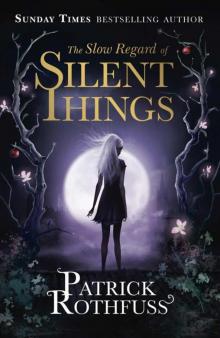 The Slow Regard of Silent Things
The Slow Regard of Silent Things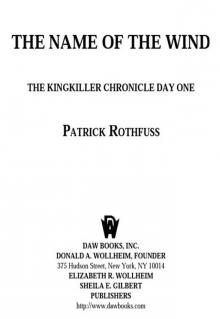 The Name of the Wind
The Name of the Wind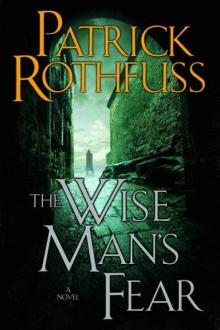 The Wise Man's Fear
The Wise Man's Fear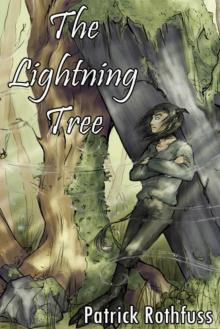 The Lightning Tree
The Lightning Tree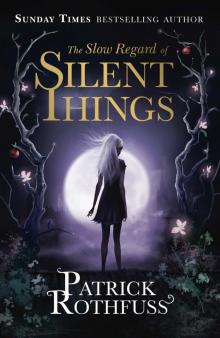 The Slow Regard of Silent Things: A Kingkiller Chronicle Novella (The Kingkiller Chronicle)
The Slow Regard of Silent Things: A Kingkiller Chronicle Novella (The Kingkiller Chronicle)![Kingkiller Chronicle [01] The Name of the Wind Read online](http://i1.bookreadfree.com/i/03/24/kingkiller_chronicle_01_the_name_of_the_wind_preview.jpg) Kingkiller Chronicle [01] The Name of the Wind
Kingkiller Chronicle [01] The Name of the Wind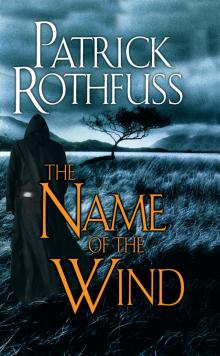 The Name of the Wind tkc-1
The Name of the Wind tkc-1